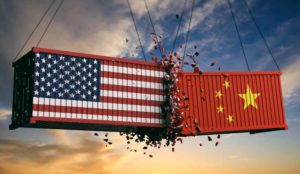
With economies severely battered, a rethinking and rearrangement of supply chains appears inevitable
There are clear and imminent indications that supply chains will be irretrievably altered in the aftermath of the pandemic. With global trade in turmoil and the blame-game becoming a veritable free-for-all, the present economic upheavals will lend themselves to a reorientation of trade patterns and review of trade deals. In
this special contribution author Eelco Dijkstra, Managing Partner, Europhia
Consulting, assesses the current logistics landscape and the certain reshaping of the contours of the supply chains globally—Editor
There is barely any facet of normal life and business that has not been impacted by the ongoing pandemic. There have been fierce debates on the origins and spread of the novel CoronaVirus (Covid-19) that have consumed the world since the start of this year. The economic fallout from the ongoing political war of words related to the pandemic between the nations of the world could be huge. It’s becoming clear that there will be a shake-up of global sourcing strategies pulling away from some of the current mass production Asian centres of manufacturing. 
THE GREAT DEPRESSION
In less than 3 months’ time, the US unemployment rate has skyrocketed to over 20% of the US workforce being sent home and now without a job. The total unemployed is now 30 Million workers. A number unheard of since the Great Depression of the 1930’s. In Europe and elsewhere around the world, the lockdown has also severely impacted economies and businesses. It is feared that the GDP of most countries will severely contract in 2020. The US first-quarter GDP contracted 4.8% and is expected to contract more than 10% for the second quarter ending end of June.
Here in the UAE, the impact is also considerable. Key sectors which have been hit thus far are the airline and hospitality industries. Emirates and Etiyad have grounded most of their passenger operations. During the lockdown most hotels across the emirates were closed as well as all restaurants, cafes and malls. Many staff were sent home, most with reductions to their salaries. Only now businesses are starting to re-open slowly. Expo 2020 has also been postponed for one year and will now start October 2021. As it becomes clear that people globally won’t be traveling much the coming 12 months this will for sure have a significant impact on the UAE’s economy in the months to come – heavily dependent on global travellers and tourists.
Mr Alain Marckus, Managing Director at First Abu Dhabi Bank was quoted in an article in Gulf News April 7th “We expect to see a sharp contraction for the second and third quarter GDP combined,” but “remain constructive for Q3-20 and beyond with an Dh100 billion stimulus and other measures, such as relief via grants and on indirect taxes to support the economy.
Elsewhere, countries globally have also designed stimulus packages to try and support faltering economies. The US has passed several bills in relief funding and tax breaks to large and small businesses totalling 2.5 Trillion USD. In Europe, governments both at national and at European Union level passed legislation for relief funding to businesses. The UK government announced to pay 80% of wages for those not working in coronavirus crisis in an effort to keep them employed with employers.
OIL PRICES
To make matters worse for oil producing nations, global oil prices went down in parallel to COVID-19. This was partially caused by an oil war between Saudi Arabia and Russia but in recent months fuelled further by lack of demand for oil due to the lockdown of much of the global economy which has meant people are not flying and driving.
Saudi Arabia announced on May 11th that it would triple its VAT rate from 5% to 15% by July 2020. It also announced plans to suspend giving out cost of living allowances starting from June 1, according to its state news agency SPA. The Saudi Finance Minister Mohammed Al Jadaan says these measures have been taken as part of the government’s efforts to manage the economic and fiscal impact of the coronavirus pandemic and the crash in oil prices.
The impact of lower oil prices on top of the COVID-19 problems will likely impact also many economies across the GCC region.
BLAME GAME – BACK TO US-CHINA POLITICS
With a US Presidential election set for November of this year, it is expected that the rhetoric from the Trump administration towards China will not wind down any time soon. As President Trump looks for a scape goat for the current economic fiasco the blame game has truly started and could get even uglier in the months to come.
At stake for the US President Trump is the Presidential election itself. However, there are underlying issues which run deeper and relate to the US-China trade deficit and the dependence the US and other countries have on China when it comes to the production of many products.
CHINA – THE WORLDS FACTORY
COVID-19 has made clear that many medical products such as Personal Protection Equipment (PPE) are actually produced in China. With the COVID-19 outbreak, countries were scrambling to find PPE medical equipment to protect their medical workers in the front line fighting COVID-19 in hospitals and retirement homes. Most of the searches for PPE supplies ended up with manufacturing suppliers back in China. As a result of the increased demand, a huge shortage of products emerged as buyers from all over the world started competing for the same products supplies. Traders saw opportunities to get in on the procurement game which sent prices soaring even further. What made matters worse was the shortage of air-cargo capacity around the world as many airlines were grounded. This also significantly increased the prices for airfreight to transport the PPE goods from China to destinations around the world.
However, China is a dominant producer of many products consumed today all across the world. Where twenty years ago, China produced relatively low value products of inferior quality, today China is a dominant producer of many high value goods such as machinery, electronics equipment, mobile phones including Apple’s Iphone. It also produces most of the apparel items for most US and European luxury retail fashion brands. China produces 72% of shoes sold in the US and it produces 49% of all toys sold in the US.
Chinese companies such as Huawei export advanced mobile network systems around the world on which entire or partial mobile phone networks of an entire country operates. We now also know that many medical products such as PPE’s are produced in China. What many people don’t know is that also many pharmaceuticals, as final product or as active API ingredients, are manufactured in China vital to the production of many of the medicines sold around the world today.
Massive Supply Chain Reshuffle After COVID-19
Citing a February survey by German supply chain consultants Kloepfel Consulting, every third company in Europe and the US has major Chinese customers and 81% of companies it surveyed rely on Chinese suppliers.
Due to retaliatory tariffs imposed on each other in the U.S.-China trade war, companies had already started diversifying their supply chains out of China. It is expected that the speed at which they do this will now accelerate.
The Trump administration has been increasingly vocal in recent weeks that US companies should reduce their reliance on China as manufacturing base.
Other governments are also reassessing their reliance on the China as manufacturing base for many Japanese companies. The Japanese government has offered to pay Japanese firms to leave China and relocate production elsewhere as part of its coronavirus stimulus worth 2 Billion USD.
Pharmaceutical Manufacturing Dependence on China
The Trump administration says the U.S. is too dependent on China for vital drugs. The US government wants to encourage more American manufacturing of pharmaceuticals and reduce dependence on China for the drugs and medical products that fuel the federal health care system.
The New York Times recently published an article which mentions that The US government effort will include a “Buy American” plan to ensure more medical and pharmaceutical products will be required through law to be purchased American-made.
The hope is that increasing government demand for American-made drugs and medical products will provide an incentive for companies to make their products in the United States, rather than China.
While the United States remains a global leader in drug discovery, much of the manufacturing has moved offshore. The last American plant to make key ingredients for penicillin announced it would close its doors in 2004.
Chinese pharmaceutical companies supply more than 90% of U.S. antibiotics, vitamin C, ibuprofen and hydrocortisone, as well as 70% of acetaminophen and 40-45% of heparin in recent years, according to Yanzhong Huang, a senior fellow for global health at the Council on Foreign Relations. China is also increasingly a large manufacturer of many API active ingredients for US pharmaceutical companies.
Supporters of reducing reliance on China have used the coronavirus epidemic to highlight what they say is a longstanding vulnerability that could leave Americans dangerously short of medicines in the event of a war, trade conflict or pandemic as we see today through the COVID-19 virus outbreak.
A final word, the post COVID-19 world will be a different world than before. Countries but also companies in many vital sectors will be reviewing their manufacturing base from a risk management perspective. They will be looking to reduce dependence in product supply from any single production source in China. Where in the past ten years, we saw a global trend of “single” sourcing of certain products we will for sure move towards a global market with dual and multiple production sources for any single product in which domestic political motives will also play a role.
Eelco Dijkstra is Managing Partner at Europhia Consulting. Europhia Consulting is an international management consulting company specialized in the logistics, supply chain and distribution sector. We operate global supply chain strategy and design assignments for our clients out of our office in the United Arab Emirates. The opinions are based on the author’s own views and understanding of the dynamics within the global supply chain sector.
To discuss your changing supply chain needs please contact Eelco Dijkstra at europhia@outlook.com






